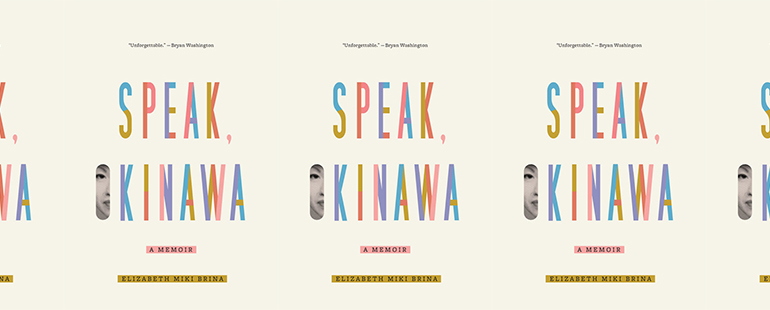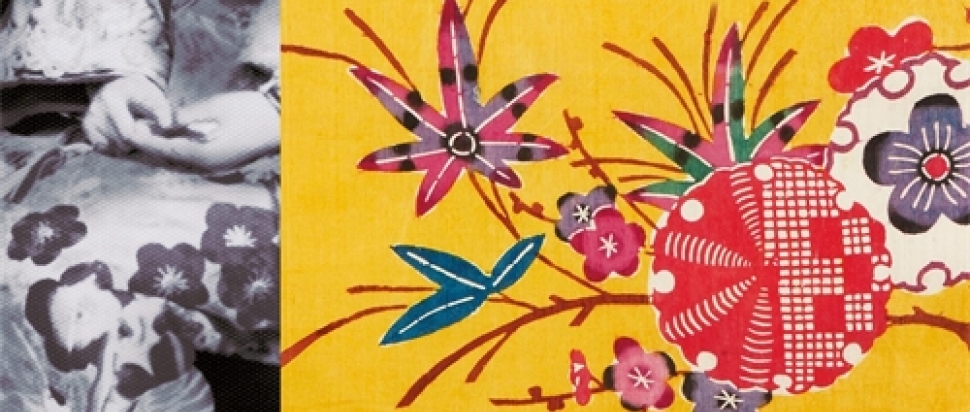Breathtakingly honest, sensitive, powerful and compelling, Speak Okinawa is a story of mixed race, mixed heritage, the isolations of the immigrant journey, and the chasms that can haunt a daughter and her mother. One family, three perspectives, three visions, three interpretations of love, sorrow and aspiration. Speak, Okinawa is indelible, and Brina's words are unforgettable.' -Bryan Washington, author of Memorial 'Speak, Okinawa is the book I've needed my entire life. Elizabeth Miki Brina plumbs the depths of mixed-race girlhood, parental love and harm, and the daily, intimate aches of growing up between cultures.

Speak Okinawa Excerpt

1 - One | tii chi |
2 - Two | taa chi |
3 - Three | mii chi |
4 - Four | yuu chi |
5 - Five | ichi chi |
6 - Six | muu chi |
7 - Seven | nana chi |
8 - Eight | yaa chi |
9 - Nine | kuku nuchi |
10 - Ten | tuu |
100 - One Hundred | hyaa ku |
Good Morning | ukimi soo chii |
Good day | hai sai |
Or | chuu wuga nabira |
Good evening | hai sai |
Good night | uyukuimi soori |
Good bye | guburii sabira |
How do you do? | hajimita wuga nabira |
How are you? | uganjuu yami seemi |
Fine thank you. | uu ganjuu sooi biin |
Thank you very much | nifee deebiru |
I beg your pardon | chaa bira |
Excuse me | guburii sabura |
I'm sorry | guburii sabitan |
That's all right | shiwaa neebi ran |
Please hurry | isujimi sooree |
Don't hurry please | yoonnaa shimi sooree |
What's this? | kuree nuuyaibiiga |
How much is it? | uree chassa yai biiga |
Do you have anything cheaper? | naahin yassa shiga ami seemi |
Hello | moshi moshi |
This is Michael | michael yai biin |
Just a minute please | ufee macchi kwimi sooree |
I'll call back later | atukara kakiya biisa |
Delicious | maa san |
It's HOT! | achiisaiibin-do |
Ouch! | agaa!! |
Expression - Surprise, anger, 'Oh my gawd!' | akisamiyoo! |
Person who talks loudly, yelling | abiyaa |
It's hot, isn't it? | achisan yaa tai |
Okinawan doughnut | andagii |
Mother | anmaa or ayaa |
Pig's feet soup | ashitibichi |
Literally ' Are you healthy?' | chya gan jyuu? |
Good afternoon | chyu uganabira |
Person | chu |
Good looking | chyuura kagi |
Pardon me. May I come in?(Used when entering a home.) | chaabira sai. |
How do you do? | chuu uganabira |
People | chu (short sound) |
Have you been well? | chaa ganjuu yaibiimi tai |
Very(much) | deijii |
Crazy person | furaagwa |
Glutton | Gachiimaya |
Mosquito | Gaajyan |
Excuse me. | Guuburi sabida |
Castle | Gusuku |
Person | Guwa |
dirty | Hagoosa |
Hello. (everyday greeting) | Hai sai |
I'm glad to meet you. | Hajimiti uganabira. |
Nice weather we are having | Il kwaa chichi |
Please come in. | Ii misooree |
Intoxicated | Iichyaa |
Small/short | Inchyaasa |
money | jin |
Good (very) | Jooto |
Hair | Karajii |
Come here. | kumankai kuuwa |
Said before eating a meal. | Kuwachi sabida |
It was very delicious/ may I be excused. | Kuwachi sabitan |
Where are you going? | maa kai ga |
Large big | magii |
Tasty, delicious | maasan |
Please come back again. | Mataa mensore |
Welcome. | Mensooree. |
Bring to me | Muchiku |
Thank you. | Nifee deebiru. |
Sleepy | Nibuii |
Sleepy head | niibu yaa |
Sweetheart (besides one's wife); girlfriend | ningurugwaa |
Goodbye | njichabira |
Life is a treasure. | Nuchi Du Takara |
What are you doing? | Nuu sou ga? |
Application | Oyoo (Japanese - bunkai) |
Honorific Mr. Ms. | Sai |
Teacher | Shinshi (Japanese - Sensei) |
Hand | Ti |
Okinawa | Uchina |
The Okinawan language | Uchina guchi |
Do you understand Okinawan? | Uchinaa-guchi wakai miseemi. |
Yes, I understand a little. | Uu, ufee wakai biin. |
People from Okinawa | Uchinanchu |
Rascal | uumaku |
Yes | Uun |
You | Unjyu |
You (polite) | unju |
Please | Unige sabida |
I don't understand | Wakaya bidan |
I understand | Wakaya bitan |
I, me, myself | Wan |
Child | Waraba |
I'm Sorry. | Wa sai bin |
Japan | Yamato |
Japanese people | Yamatonchu |
Japanese language | Yamatoguchi |
Not good looking | yanakaagii |
Bad weather isn't it? | Yanakwaa chichi |
Loud, noisy | Yagui |
Bad child | Yana waraban |
Rest awhile. | yukuimisooree |
talkative | yuntaku |
Ataishi turu atairu. - We get along well with those we can get along with well.
Achinee ya tankaa mankaa. - Business is a two-way street.
Aramun jooguu ya duu ganjuu. - One who eats plain food is healthy.
Ichariba choodee. - Once we meet and talk, we are brothers and sisters.
Uya yushi kwa yushi. - Parents and children teach one another.
Kaagee kaa ru ya ru. - Beauty is skin deep.
Kamuru ussaa mii nayun. - The more you eat, the more you gain.
Kuu sa kana sa. - Small things are lovable.
Kuchi ganga naa ya yakutatan. - A smooth talker is a good-for-nothing person.
Kutubaa. Jin chikee. - Spend words as efficiently as money.
Kutuba noo ushikumaran. - A word can't be recalled once spoken.
Shikinoo chui shiihii shiru kurasuru. - Let's live helping each other in this world.
Shinjichi nu ada nayumi. - Kindness will never be wasted in any way.
Jin too waraaran kwa tu ru waraariiru. - We can laugh happily with our children, but not with money.
Chu uyamee ru duu uyamee. - If you respect others, they will respect you.
Choo kukuru ru dee ichi. - The heart is the most essential human quality.
Tusui ya tatashina mun. Warabee shikashina mun. - The old should be Treated with due respect. Children should be treated with gentleness.
Tusui ya takara. - The old people are treasures to us.
Miitundaa duu tichi. - Man and wife are one flesh.
Nuchi nu sadamee wakaran. - Only God knows one's term of life.
Machushi garu ufu iyoo tuyuru. - One who waits patiently will catch a big fish.
Miinai chichi nai. - We learn by watching and listening.
Mii ya tin niru aru. - Our fates are as registered by heaven.
Munoo yuu iyuru mun. - Speak well of others.
Yaasa ru maasaru. - Food is delicious when one is hungry.
Duu nu duu ya duu shiru shiyuru. - You know your body best.
Choo kani ru deeichi. - Common sense is essential.
Yii kutoo isugi. - Do good things quickly.
Chira kaagi yaka chimu gukuru. - Kind hearts are better than fair faces.
Yuu ya shititin mii ya shitinna. - Even if you hide yourself from the world, don't lose sight of your real nature.
Nmarijima nu kutuba wasshii nee kuni n wasshiin. - Forgetting your native tongue means forgetting your native country.
Ashibi nu chura saa ninju nu sunawai. - The more the merrier.
Acha nu neen chi ami. - Tomorrow is a new day.
Yikiga nu kutubaa shuumun gaai. - A man's word is his honor.
Mookiraa kwee michi shiri. - Once you have made a fortune, know how to spend it.
Notes on PronunciationThere are five vowels:
The double vowels are pronounced with the longer vowel sound. For example: dee is pronounced more like 'day' as opposed to 'dee' (long 'e' sound).
REFERENCES
Higa, E. (1976). Okinawan Classical Music: Analysis of Vocal Performance, Master's Thesis,
Shimabukuro, Z. ( Unknown). The Okinawan Mind in Proverbs, Publisher Unknown, (excerpts
Unknown, (2000). Okinawa FAQ: Frequently Asked Questions and Glossary, (available
E-mail comments Here! . Last modified on 7 October 2002.
|
Publisher Knopf
Publication Date 2021
SectionNew Hardcover - Biography
A searing, deeply candid memoir about a young woman’s journey to understanding her complicated parents—her mother an Okinawan war bride, her father a Vietnam veteran—and her own, fraught cultural heritage.
Elizabeth’s mother was working as a nightclub hostess on U.S.-occupied Okinawa when she met the American soldier who would become her husband. The language barrier and power imbalance that defined their early relationship followed them to the predominantly white, upstate New York suburb where they moved to raise their only daughter. There, Elizabeth grew up with the trappings of a typical American childhood and adolescence. Yet even though she felt almost no connection to her mother’s distant home, she also felt out of place among her peers.
Decades later, Elizabeth comes to recognize the shame and self-loathing that haunt both her and her mother, and attempts a form of reconciliation, not only to come to terms with the embattled dynamics of her family but also to reckon with the injustices that reverberate throughout the history of Okinawa and its people. Clear-eyed and profoundly humane, Speak, Okinawa is a startling accomplishment—a heartfelt exploration of identity, inheritance, forgiveness, and what it means to be an American.
New This Week
Shop this week's new arrivals, updated every Tuesday.
Shipping & Curbside Pickup
We ship anywhere in the U.S. and orders of $75+ ship free via media mail!
Classic Totes
Speak Okinawa By Elizabeth Miki Brina
Tote bags and pouches
in a variety of styles,
sizes, and designs, plus mugs, bookmarks, and more!


